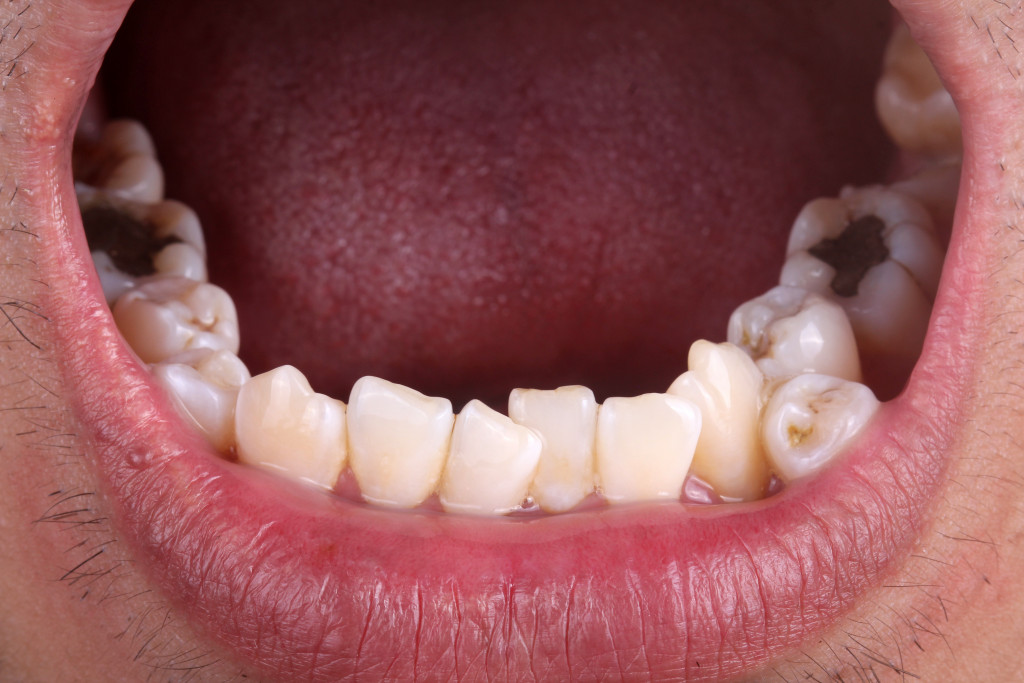• Misaligned teeth can lead to plaque buildup, cavities, gum disease, jaw pain, and headaches.
• Treatment options include orthodontic treatments such as braces, dental bonding or crowns/veneers, and jaw surgery.
• Brushing twice daily, flossing, and using an interdental brush or water flosser, can help prevent misalignment.
• Visit your dentist regularly for checkups to catch any issues before they become more serious.
While many people think of having misaligned teeth as a cosmetic issue, the truth is that it can have far-reaching consequences on your overall dental health. Here’s a look at the risks associated with misaligned teeth and what you can do to prevent them.
The First Signs of Trouble
You may go about your everyday life without noticing the slight misalignment of your teeth, but this can lead to a few issues. That’s because when teeth are slightly out of alignment, they can rub together unnaturally and cause small chips or cracks that could eventually become bigger problems.
Other potential signs of trouble include discomfort while chewing and grinding your teeth and an increased risk of gum disease. This increases the following risks associated with misaligned teeth:
The Risk of Tooth Decay and Gum Disease
When your teeth are not properly aligned, it can lead to plaque buildup and an increase in cavities. This is especially true when there are deep pockets around crooked or overlapping teeth where food particles can get stuck. These pockets are difficult for toothbrushes and floss to reach, leaving them even more susceptible to bacteria buildup, leading to gum disease and tooth decay.
Misaligned Teeth Can Lead To Jaw Pain & Headaches
Misaligned teeth can also cause issues with your jaw muscles and joints due to the extra strain they’re under to chew properly. This can lead to chronic pain in the jaw area and headaches from muscle tension. If left untreated, this tension will only worsen over time, leading to further issues such as TMJ (Temporomandibular Joint) Disorder which affects both the jaw joint and surrounding facial muscles.
TMJ symptoms include pain and stiffness in the jaw, difficulty opening and closing your mouth, and a clicking or popping sound when you move your jaw. You may also experience earaches, headaches, and ringing in the ears.
Impacts Your Speech & Self-Confidence
Having misaligned teeth can also affect your speech by changing how you pronounce certain words or making it difficult for you to enunciate clearly. Additionally, having crooked or overlapping teeth may lead to feelings of self-consciousness when smiling or speaking, making social interactions uncomfortable for those affected.
What You Can Do
The good news is that it’s never too late to address misaligned teeth. Your dentist can recommend different options based on the severity of your case, such as the following:
Orthodontic treatments: Orthodontic treatments such as braces can help straighten teeth and correct misalignment. This is done using brackets and wires to gradually move teeth into proper positions.
Retainers: A retainer is a custom-made device that helps your teeth stay corrected after removing braces. It comes in the form of a removable or fixed appliance worn for certain nights.
Dental bonding: Dental bonding is a procedure where a tooth-colored material is used to reshape teeth and fill in gaps. This can be a quick and effective solution for minor misalignment issues.
Dental crowns or veneers: Dental crowns and veneers can cover and reshape teeth. Unlike dental bonding, these are more permanent solutions that can provide a more natural look.
Jaw surgery: A jaw surgery is required when the misalignment is severe, and other treatments are ineffective. The jawbone is cut and reshaped to realign the teeth and jaw. This is typically done as a last resort and is usually only recommended when the misalignment significantly impacts your daily life.
Preventive Measures
Although misalignment is often caused by genetics, it can sometimes be prevented with proper oral care. This includes brushing your teeth twice a day, flossing at least once a day, and using an interdental brush or water flosser to clean between your teeth. Wearing a mouthguard is also important if you participate in contact sports. Additionally, visiting your dentist regularly for checkups and cleanings is key to preventing misalignment, as it can help catch any issues early on before they become more serious.
It’s clear that having misaligned teeth is not just a cosmetic issue but impacts your dental health and overall well-being if left untreated. Fortunately, treatments are available. If you have an issue with your alignment, it’s best to consult a dentist immediately, so they can evaluate the situation and provide solutions accordingly. Taking action now will save you from long-term complications down the line!


